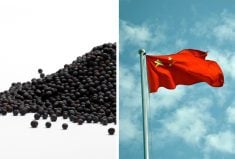CHICAGO (Reuters) — Bunge Ltd. has reduced the size of its pipeline of soybeans flowing to China, the world’s top importer of the oilseed, after overestimating demand late last year, chief executive Soren Schroder said on Thursday.
The decision to scale back shipments to the world’s most populous nation reflects the impact of China’s slowing economy on one of the largest agricultural trading houses.
Bunge, a top soybean processor, typically has supplies headed to China from producers such as Brazil to keep crushing plants supplied “like a floating conveyor belt,” Schroder said.
Read Also

Canada and China discuss disputes over canola and EVs, says Ottawa
Senior Canadian and Chinese officials discussed bilateral trade disputes involving canola and electric vehicles on Friday, Ottawa said, but gave no indication of any immediate breakthrough.
However, in late December the company suffered a US$30 million loss as the value of soybeans being delivered to China in its inventory pipeline dropped below what Bunge had paid for them, Schroder said.
Bunge mistakenly had expected an increase in demand, he added in an interview after the company reported weaker-than-expected fourth quarter earnings.
“We’re scaling back on the size of the pipeline that we have flowing into China to reduce the risk of it, so we don’t have things like what just happened, happen again,” he told Reuters.
China’s slowing economy — 7.4 percent growth in 2014 was the weakest in 24 years — has weighed on global markets as it is the world’s biggest buyer of iron ore, coal, copper and soy, and the second-largest crude oil importer after the United States.
China imported 6.88 million tonnes of soy last month, below a record set in December but above the 5.9 million tonnes imported in January last year. High imports coupled with weaker demand have hurt crushing margins.
“We misjudged demand and the timing of it by a couple of percentage points,” Schroder said.
Bunge expects market conditions to improve in China, which is home to about 10 to 15 percent of the company’s crushing business, but to remain challenged.
Quarterly earnings fell $30 million to $50 million short of internal expectations, and “a big part of that relates to how we managed the pipeline to China,” Schroder said.
Chinese buyers snapped up U.S. soybeans early in the crop year that began Sept. 1, only to watch prices tumble on expectations for huge crops from South America.
Chinese buyers cancelled at least 579,000 tonnes of soybean purchases from the United States during the second half of January, according to the U.S. Department of Agriculture. China subsequently re-booked at least 407,000 tonnes as futures sank.














